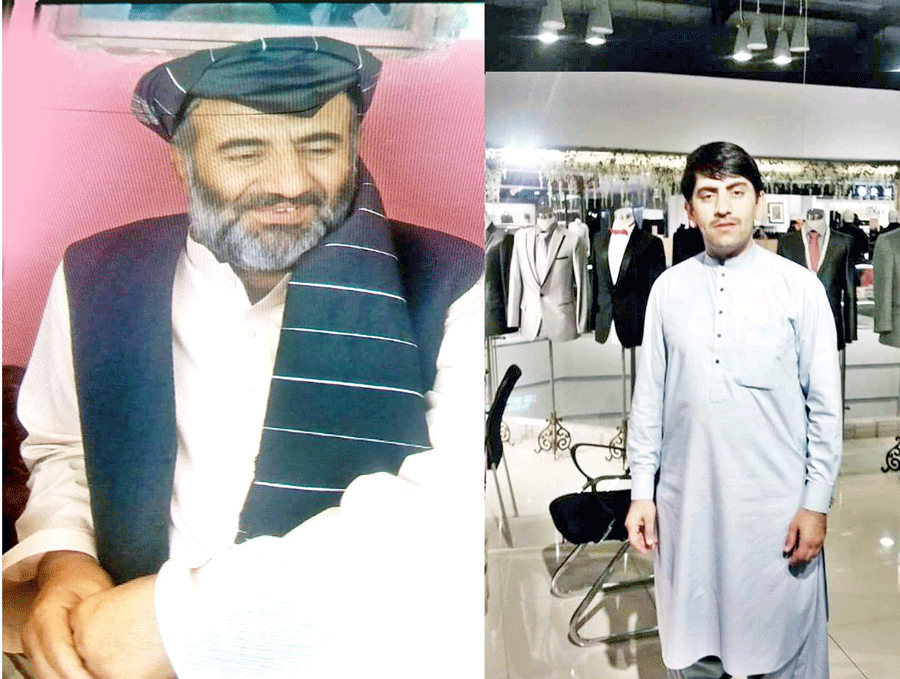The Sino-Baloch Connection
By Adnan Aamir | Newsbeat National | Published 6 years ago

Niaz Muhammad (L) and Zahir Shah, Baloch traders who were killed in the attack on the Chinese consulate in Karachi.
The passenger buses from Quetta arrived in Karachi in the early hours of November 23, 2018, with Niaz Muhammad and his son, Zahir Shah, among the thousands in tow. The father-son duo stopped at the Quetta Hotel to freshen up after a night of travel, had breakfast and killed time before their appointment at the Chinese Consulate in Clifton later that morning.
Niaz, 55 and Zahir, 26, belonged to a trading family of Killa Abdullah in northern Balochistan. Niaz, a seasoned clothes trader, often travelled to China with his son – whom he was grooming to run the business – to purchase clothing items that could be sold locally. Zahir had already been there thrice and was about to apply for a Chinese visa for his fourth visit.
When the two were about to enter the Chinese Consulate, there was a sudden shower of bullets followed by grenade explosions. The Chinese Consulate was stormed by three attackers, who were ostensibly on a suicide mission, and the guards outside the consulate engaged them in a gun battle. The episode ended with the death of all three attackers, along with two policemen and the two traders – Niaz and Zahir.
The attack which was claimed by Baloch insurgents, resulted in the death of the two Baloch traders, who were caught at the wrong place at the wrong time. But what was even more tragic was that neither the Sindh nor Balochistan governments provided their families with any sort of assistance in transporting their bodies to Quetta.
While traders can apply for visas to Iran and Afghanistan from Quetta, for all other visas they must travel to Karachi. This is a huge inconvenience for the traders of the province as it increases their cost of travel and discourages them from travelling out of the country for trade purposes. Their chances of growth decline as a result.
The Quetta Chamber of Commerce and Industries, established in 1972, is the representative body for the traders of Quetta. With over 2,000 members, the body promotes trade and strives to resolve the problems faced by traders. Salahuddin Khilji, 38, is the Senior Vice President of the chamber and specialises in the trade of chromite – a mineral. “China presents a lot of trading opportunities for traders in Balochistan, but we face a lot of difficulty in travelling there,” he tells Newsline.
Khilji revealed that a business visa costs up to Rs 150,000 and is valid for only three to six months. “The cost is further increased because the traders have to travel from Quetta to Karachi to apply for a visa,” he says. Speaking about his chromite business, he says that there is a huge demand in China for the mineral, but the duties and taxes imposed on it by Pakistan result in a loss for the traders.
Rahim Kakar, 43, runs a tube-well business in Quetta. He has formerly served as chairman of the Association of Traders of Balochistan. He says that worldwide, members of chambers of commerce get benefits while trading with foreign countries. “There is no benefit whatsoever for the members of the Quetta Chamber of Commerce and Industries when it comes to trading with foreign countries such as China,” he tells Newsline. Kakar demands that a Chinese visa application centre be established in Quetta.
The annual volume of trade between Pakistan and China is roughly over $16 billion. Progress on the China-Pakistan Economic Corridor (CPEC) projects will increase this trade. There is huge potential in Balochistan to tap the Chinese market. Traders there can make fortunes by selling fruit and minerals to businesses in China.
The Chief Minister of Balochistan, Jam Kamal, also realises the trade opportunities that China provides for Balochistan. While speaking to a group of journalists in November last year, he said that China offers an export potential of over $5 trillion and if Balochistan could only tap a small portion of this, it would change the fortunes of the province. He also announced that he was planning to organise road shows in Shanghai to showcase the products of Balochistan for Chinese markets. But since Jam Kamal’s government is struggling to survive, he could not follow up on his plan.
Moreover, banking transactions with Chinese companies, too, prove to be an uphill struggle for the traders of Balochistan and the cost of such transactions is high in conventional banks in Pakistan. A branch of the Bank of China was established in Karachi for this purpose, but this too is out of reach for the traders of Quetta. “A branch of the Bank of China should be opened in Quetta as well,” suggests Khilji.
Balochistan suffers from chronic unemployment and job prospects are minimal. There is a limited trading community in the province, which provides with a decent livelihood. This trading community needs to be supported by the government so that it can grow and produce more jobs and generate taxes for the government. However, the federal government of Pakistan has shown no interest whatsoever in assisting the traders of Balochistan. The least that can be done is to persuade the Chinese government to establish Chinese visa application centers in Quetta and Gwadar. This will make a huge difference for the trading community of the province.


